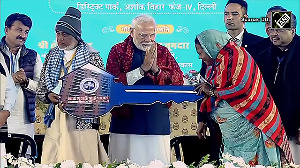The statement by West Bengal Director General of police Naparajit Mukherjee, regarding a nexus between Naxals and the Inter-Services Intelligence is something that needs to be taken seriously, says Vicky Nanjappa.
There has been much talk about this since the last three years, and investigations by the police, the Intelligence Bureau and the anti-Naxal force have revealed that this link was established through a group in Dubai.
According to a source, the ISI made the first move three years ago, with the intention of exploiting this internal problem, since they believed that funding the Naxal moment would help causing more destability in India. But the Naxals thrived on local support, and believed that any links with a Pakistani agency would be fatal to their cause.
But even they were wary in their refusal, because they realised that if the going got tough for them, they could rely on financial help by the ISI.
A source said that the ISI used smugglers based out of Dubai to make contact with the Naxals, and ensured that only Indian nationals were part of this initial deal.
The police got their first break when they busted a fake currency racket, which was operating between Karnataka, Kerala and Dubai.
One of the arrested men, Altaf, told the police that the gang was trying to establish a link between the underworld in Dubai and the Naxals. He claimed that he was instructed to hand over Rs 25 lakh to a Naxal sympathiser.
The police found later that this Dubai-based group in Dubai was into smuggling and was playing a huge part in the fake currency racket. This group was also contributing funds to the ISI which was being used to finance terror operations. The police also nabbed another gang that had managed to get in touch with some Naxal leaders, and had offered financial assistance.
Previously, the ISI has also made several attempts to lure the Naxals through operatives in Kashmir and members of the Lashkar-e-Tayiba. The ISI sent Umer Madani, who is a LeT operative to hold talks with the Naxals.
However before he could strike any deal, he was arrested by the Delhi police. During his questioning he revealed that he had been instructed to pass on money to the Naxals. The next attempt was made by another operative Yusuf Salim, who too was arrested and confessed that he had been sent from Kashmir to strike a deal with the Naxals.
The ISI finally tasted success when it roped in a cadre of the Students Islamic Movement of India. This happened around the time when the government was coming down hard on the Naxals, and they were running out of funds, and all their dedicated supply routes were blocked by the police.
According to a source, cadres of the SIMI relocated into Naxal infested areas around this time. This group had a better network and was well-versed with the international routes through which arms and ammunition could be smuggled in.
The police found the strongest link in West Bengal. Groups such as the Harkat-ul-Jihad al-Islami have also taken the help of SIMI cadres have a dedicated network in the state, and hence any movement of arms ammunition or funds is easier.
Though, intelligence agencies warn that while the problem may be the biggest in West Bengal, ISI-backed groups are trying to reach out to the Naxals in other states such as Andhra Pradesh and Maharashtra.









 © 2025 Rediff.com -
© 2025 Rediff.com -